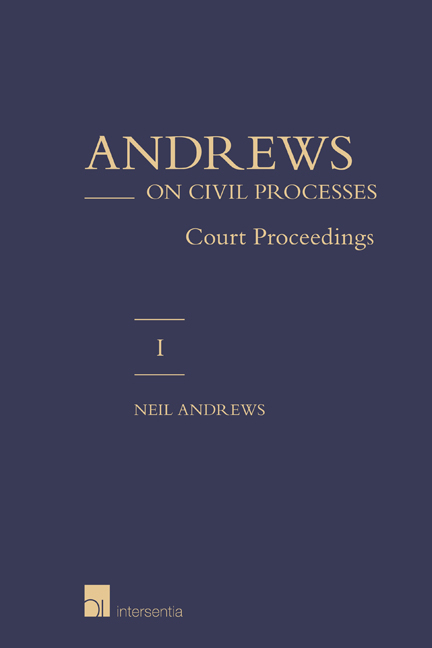Book contents
- Frontmatter
- Dedication
- Epigraph
- Preface
- Contents
- Table of Cases
- Table of Statutes
- Table of Statutory Instruments
- PART I INTRODUCTION TO THE FORMS OF CIVIL JUSTICE
- PART II COMMENCEMENT OF COURT PROCEEDINGS AND PREPARATION FOR TRIAL
- Chapter 4 The Six Phases of Court Proceedings
- Chapter 5 Commencement and Service
- Chapter 6 Pleadings and Parties
- Chapter 7 Counterclaims and Set-Off
- Chapter 8 Limitation of Actions
- Chapter 9 Case Management and Procedural Discipline
- Chapter 10 Pre-Trial Termination of Actions Without Settlement: Interim, Summary, Default, Preliminary and Striking Out Procedures
- Chapter 11 Disclosure
- Chapter 12 Privileges
- Chapter 13 Experts
- PART III END-GAME: TRIAL, APPEAL, FINALITY AND ENFORCEMENT
- PART IV COSTS AND FINANCING OF LITIGATION
- PART V SPECIAL PROCEEDINGS
- PART VI PRINCIPLES OF CIVIL LITIGATION
- PART VII THE EUROPEAN CONTEXT
- Select Bibliography
- Index to Volumes I and II
Chapter 13 - Experts
from PART II - COMMENCEMENT OF COURT PROCEEDINGS AND PREPARATION FOR TRIAL
Published online by Cambridge University Press: 13 December 2017
- Frontmatter
- Dedication
- Epigraph
- Preface
- Contents
- Table of Cases
- Table of Statutes
- Table of Statutory Instruments
- PART I INTRODUCTION TO THE FORMS OF CIVIL JUSTICE
- PART II COMMENCEMENT OF COURT PROCEEDINGS AND PREPARATION FOR TRIAL
- Chapter 4 The Six Phases of Court Proceedings
- Chapter 5 Commencement and Service
- Chapter 6 Pleadings and Parties
- Chapter 7 Counterclaims and Set-Off
- Chapter 8 Limitation of Actions
- Chapter 9 Case Management and Procedural Discipline
- Chapter 10 Pre-Trial Termination of Actions Without Settlement: Interim, Summary, Default, Preliminary and Striking Out Procedures
- Chapter 11 Disclosure
- Chapter 12 Privileges
- Chapter 13 Experts
- PART III END-GAME: TRIAL, APPEAL, FINALITY AND ENFORCEMENT
- PART IV COSTS AND FINANCING OF LITIGATION
- PART V SPECIAL PROCEEDINGS
- PART VI PRINCIPLES OF CIVIL LITIGATION
- PART VII THE EUROPEAN CONTEXT
- Select Bibliography
- Index to Volumes I and II
Summary
INTRODUCTION
Experts are needed in the civil process because ‘no judge is omniscient’ and ‘we cannot demand of the judges that they have knowledge of every branch of science, of every art and of the mysteries of every profession.’ This chapter concerns expert witnesses in English court proceedings (and apart from court assessors) rather than background expert advisors to litigants. Advisory consultation with experts is not covered by the CPR regime, that is, where a litigant obtains an opinion from an expert, but that opinion is not for use as evidence in the case (see further below, 13.36). Nor does the CPR system govern experts submitting opinions before, or reporting to, arbitral tribunals (14.32, vol II). Public funding of expert reports in care proceedings was discussed by Sir Nicholas Wall, P, in A Local Authority v. S (2012), where he noted problems posed by budgetary constraints.
The CPR aims to curb the perceived excesses of the party-appointed ‘battle of experts’. The three problems experienced before the CPR system were: first, the tendency for expert witnesses hired by a litigant to lose objectivity and tailor their report to suit that party's case; secondly, the need to control the number of experts involved in a particular case, especially with a view to achieving proportionality between their use and the case's value or importance; thirdly, the need to promote ‘equality of arms’ between rich and poor parties. Under the CPR system the main rule is that no expert evidence can be presented in a case unless the court has granted permission. This control is a facet of the court's case management powers.
Under the CPR, there are three ways in which the ordinary civil courts can receive expert opinion: by a ‘single, joint expert’, party-appointed experts, and court assessors. These will be introduced in turn in the ensuing discussion.
Lord Woolf in the Interim Report (1995) had contemplated a much larger role for expert court-assistants, to be appointed by the court to act as independent experts in a particular case. However, this was resisted on the ground that in the larger cases there should be debate and the parties should retain control of the adversarial debate.
- Type
- Chapter
- Information
- Andrews on Civil ProcessesCourt Proceedings, pp. 349 - 376Publisher: IntersentiaPrint publication year: 2013



